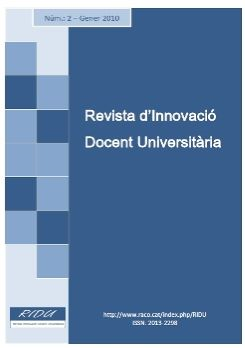Cooperative learning and skills
DOI:
https://doi.org/10.1344/105.000001520Keywords:
Collaborative learning, Competencies, EvaluationAbstract
We call cooperative learning to a group from teaching and learning procedures that begin of the organization of the classroom in heterogeneous composition small groups, that work together and way that his members' objectives are so closely linked, that his successful possibility in the achievement of these objectives depends only and exclusively according to which the rest of them also reach theirs, that are the same. This procedure set have in common the positive interdependence between the group memberships, the individual accountability, the face-to-face positive interaction, inherent abilities to small groups and group's dynamic or process.
It is basic, in a constructivist learning process, that students, belong to the level that is, (any person that learns) ponder on his own learning and that this learning be social, this is, that is learn with other. These work strategies are optimal to achieve that students acquire specific and generic skills of each level of education. In this contribution, is pondered on advantages that cooperatively work offers for better to reach the education in responsibilities that his citizens' demand society.
References
Johnson, D.W., Johnson, R.T. y Smith, K.A. (1991) Active Learning: Cooperation in the College Classroom. Interaction Book Company.
García González, E. (2005) Vigotski: La construcción histórica de la psique. Biblioteca Grandes Educadores, Vol. 9, Ed. Trillas.
En: http://www.4teachers.org, apartado “Rubistar”.
Bloom, B.S., Englehart, M.D., Furst, E.J., Hill, W.H. y Krathwohl, D.R. (1956) Taxonomy of educational objectives: The classification of educational goals. Handbook I: Cognitive Domain. New York: Longmans Green.
Slavin, R. E. (1995) Cooperative learning: Theory, research, and practice. (2nd ed.) Allyn and Bacon, Boston.
Downloads
Published
Issue
Section
License
Copyright (c) 2010 Revista d'Innovació Docent Universitària

This work is licensed under a Creative Commons Attribution 4.0 International License.
Authors whishing to publish in this journal agree to the following conditions:
- The author or author retain copyright and grants the journal the right of first publication of the paper.
- The texts will be published under license "Reconocimiento Creative Commons 4.0 España", which allows to share, distribute, reproduce and the public communication of the paper, as long as the name of the author or authors and the journal are clearly stated.







